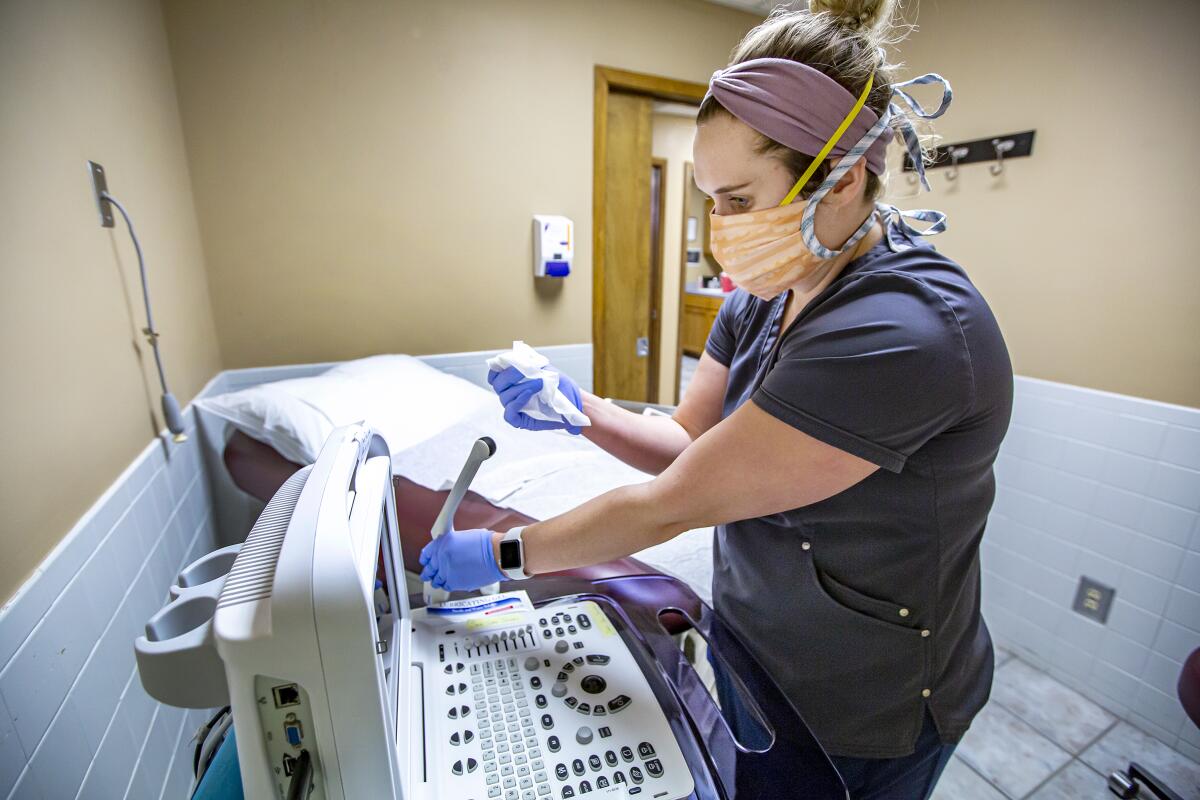Op-Ed: Texas gives us a glimpse into a world without abortion care training

- Share via
We’re getting a clearer picture every day of the devastating effect of Texas’ near-total abortion ban. Many people are traveling out of state to get abortion services, and some have come to San Francisco, where I work. With the Supreme Court now poised to overturn the constitutional right to abortion in a matter of weeks, the national impact will be enormous as many more states ban abortion care.
One consequence we haven’t fully reckoned with is how these antiabortion laws will affect the training of healthcare workers.
When Texas’ abortion ban went into effect, the number of abortions provided in clinics plummeted. Ob-gyn residents in Texas were suddenly cut off from the opportunity to get the abortion training they needed. Our team at the Ryan Residency Program, a national initiative to integrate family planning training in obstetrics-gynecology residency programs, connected Texas hospitals with programs in other states such as New York, California and Oregon that were willing to accept residents for training.
When healthcare professionals are not taught about abortion as a part of comprehensive reproductive health, patients suffer. The consequences go far beyond the skilled abortion care that people need and deserve. Our research shows that without routine abortion training, ob-gyn residents don’t feel comfortable providing care for people with early pregnancy loss. They are less likely to feel prepared to counsel people or provide aspiration procedures that may be needed to manage a miscarriage. Residents simply may not have enough practice to feel competent in these techniques.
The leaked opinion’s ignorance of the true history of abortion — or worse, its duplicity — suggests that politics not the law is driving the fall of Roe vs. Wade.
Additionally, if they are not in a place that stocks mifepristone, which is used for medication abortion, they may not learn how to medically manage a miscarriage using the most effective medication. That’s not uncommon given that federal regulations require clinics and hospitals to jump through hoops to keep the medication on hand, and states hostile to abortion access are working to make that medication even more difficult to obtain.
Even though the procedures used for abortion and managing miscarriages are the same, at hospitals that only offer aspiration procedures in the operating room under general anesthesia, residents might not learn to do them in an outpatient setting, which is preferred by many patients.
In states that have near-total or total bans on abortion, residents who graduate from ob-gyn programs may not be prepared to care for future patients wherever they end up practicing. As states become more restrictive, we know that more people will manage their own abortions outside of a clinical setting. This can be done safely, but some people may need follow-up care from trained providers. And when people experience significant life-threatening complications with their pregnancies, ob-gyns who are not fully trained with abortion techniques would be ill-prepared to provide appropriate care.
We were only able to provide training for 50 people from seven Texas programs (of more than 500 in 23 residency programs in the state). The need will certainly grow when the Supreme Court hands down its decision on abortion rights in the Dobbs vs. Jackson Women’s Health Organization case. More than half of states are certain to severely restrict or ban abortion in response to the decision, which will then affect the training of thousands of residents nationwide.
Even doctors who manage to get training despite restrictions in their states may well leave for places that protect abortion services. They might not want to practice in places where patient care is severely compromised. (In one Texas case, a woman was sent on an out-of-state flight in the middle of a miscarriage to get care, because Texas law barred an abortion at that stage in her pregnancy.) And they may not want to place themselves in legal peril in states like Oklahoma where the latest ban makes providing an abortion a felony punishable by up to 10 years in prison.
When it comes to conservative Supreme Court justices’ views on abortion, words seem to have lost their meaning.
There are dedicated healthcare providers who will continue to practice in places with abortion restrictions and do everything they can for their patients. But many will understandably decide against stepping into that hostile landscape.
Our country needs to treat what’s happening as the multifaceted crisis that it is. Professional medical organizations need to hold the line on the importance of routine abortion training. We need to develop more innovative ways to train ob-gyns, primary care providers, advanced practice clinicians and nurses to provide this essential care.
Governments at every level, from the federal down to the local, need to invest resources in addressing all aspects of this human rights crisis — including the threat to medical training caused by abortion bans. This danger will cause irreparable harm to countless current and future patients seeking care.
Jody Steinauer is an ob-gyn and the director of the Bixby Center for Global Reproductive Health at UC San Francisco and the Kenneth J. Ryan Residency Training Program in Abortion and Family Planning.
More to Read
A cure for the common opinion
Get thought-provoking perspectives with our weekly newsletter.
You may occasionally receive promotional content from the Los Angeles Times.












